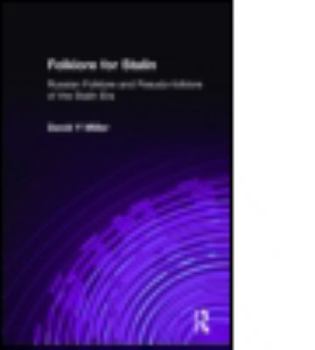Folklore for Stalin: Russian Folklore and Pseudo-folklore of the Stalin Era
After the First Congress of Soviet Writers in 1934, folklore, like literature, became an instrument of the political propagandist. Folklorists devoted considerable efforts to attending to what purported to be a rebirth of the Russian epic tradition, producing works of pseudofolklore that as often as not featured Joseph Stalin in the hero's role. Miller's account of this curious episode in the history of popular culture and totalitarian politics, and his synopses and translations of "classic" examples of folklore for Stalin, seek to serve as a resource not only for the study of contemporary folklore but also for the political scientist.
Format:Hardcover
Language:English
ISBN:0873326687
ISBN13:9780873326681
Release Date:October 1991
Publisher:Routledge
Length:214 Pages
Weight:1.05 lbs.
Dimensions:0.5" x 6.1" x 9.2"
Customer Reviews
0 rating





